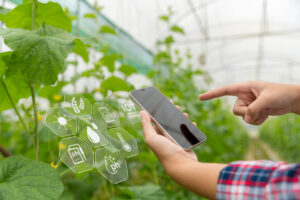In today’s rapidly changing world, digital agriculture technology has become an essential tool for modern farmers. It affects several vital areas, from increasing a farm’s productivity and profitability to improving its environmental health and viability. Safeguarding crop health, minimizing herbicide applications, automating operations, and having the access to detailed farm data about crops, the herds, and machinery are among the many ways digital agriculture is employed on a farm.

Popular digital technologies used in agriculture :
A wide array of digital technologies are currently revolutionizing the agriculture sector holistically.
Here are some of the most widely used digital technologies:
- GPS technology permits farmers to navigate their fields with remarkable precision, minimizing overlap and wastage of inputs while enhancing the overall productivity.
- Temperature and moisture sensors offer real-time information on the field conditions, enabling farmers to optimize irrigation and other farming practices depending on actual field conditions.
- Precision irrigation tools employ data and connectivity to provide the correct amount of water at the right time, enhancing water efficiency and crop health.
- Machine learning and data analytics assist farmers analyze data from diverse sources to make well-informed decisions and predict their operations.
- Automated machinery performs tasks with the needed precision. It reduces natural human error, thereby minimizing productivity and making the farm environment a significantly safer place to work.
Conventional Farming vs. Digital Agriculture:
Conventional farming has been the mainstay of agriculture for centuries. It involves farmers using traditional methods such as ploughing, planting seeds, and manually harvesting crops. While this method has its benefits, it can be time-consuming and labour-intensive.
Digital agriculture companies are changing this age-old practice by introducing technology-driven solutions that make farming more efficient and profitable. For instance, intelligent sensors can now be installed in real-time to monitor soil moisture levels and nutrient content. This information helps farmers decide when to water or fertilize their crops.
In addition, drones equipped with advanced imaging technology are used to survey large farms quickly. This innovative approach saves time while providing a comprehensive view of the farm’s condition.
Moreover, digital agriculture technology also focuses on precision farming techniques that enable farmers to use resources efficiently while reducing waste. By employing data analytics tools like machine learning algorithms and artificial intelligence (AI), farmers can optimize crop yields based on climate changes over seasons.
Digital agriculture is revolutionizing the way we farm today by leveraging cutting-edge technologies that streamline processes for maximum efficiency without sacrificing sustainability practices or profitability!
Digitize field and farm management operations:
A farm monitoring and management solution can help farmers geotag their farms, digitize records, share advisory, monitor crop productivity, improve an agricultural farm’s efficiency, and boost field officer productivity. These can also serve as easy-to-use, seamless communication solutions connecting growers, agri-businesses and field officers and helping digitize grower activities. Such easy-to-trace digital solutions eliminate counterfeiting and ensure that every individual involved in bringing food to our table is recognized and rewarded. These solutions help streamline farm data capture and management and other complex field operations involved during seed production, seed strain tracking and trial across generations, crop protection and nutrition development – both on and off the field – for row crops, horticulture and plantations.
Accelerating digitization with Cloud:
Cloud platforms created for agriculture leverage the advancements in earth observation, remote sensing, data and machine learning algorithms, and cloud computing to enable the agri-ecosystem to innovate to reach great heights. The crop protection sector can access ready-to-use data sources and AI-powered agriculture intelligence on an easy-to-use, integrated platform to accelerate digital transformation. The scalable agri-stack of cloud platforms comprises a formidable triad of platform layers, including applications for digitization, Machine Learning-ready data pipelines for enhanced analytics, and field-tested AI/ML models for business insights and predictive intelligence.
Mitigating challenges in supply chain management:
Digitization is essential to ensuring the efficiency of the supply chain management in agriculture. It brings transparency and eliminates errors caused by conventional methods. Furthermore, high-quality data – a direct outcome of digitization – lends an operational edge to businesses, necessary for efficient supply chain management (SCM).
Accurate, verifiable, and contextually relevant data is imperative to:
- Reducing the demand-supply gap
- Improving farmer engagement
- Keeping up with fast-changing consumer preferences
In conclusion:
Digital agriculture is revolutionizing the farming industry by providing innovative solutions for farmers. These companies offer farmers various benefits, including increased efficiency, reduced costs, and improved yields. By leveraging technology such as IoT devices, machine learning algorithms, and big data analytics, these companies can provide insights to help farmers make better crop decisions.
The future is bright for digital agriculture. With advancements in technology continuing at an unprecedented pace, there is no telling what innovations will come next. Digital agriculture provides a path forward toward achieving this goal. If you are looking for the latest digital agriculture technologies to apply to your farm, consult our experts at SoilOptix® today!
